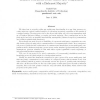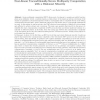9 search results - page 1 / 2 » Protocols for Multiparty Coin Toss with Dishonest Majority |
CRYPTO
2010
Springer
13 years 9 months ago
2010
Springer
Coin-tossing protocols are protocols that generate a random bit with uniform distribution. These protocols are used as a building block in many cryptographic protocols. Cleve [STOC...
STOC
2004
ACM
14 years 9 months ago
2004
ACM
We show how to securely realize any multi-party functionality in a way that preserves security under an a-priori bounded number of concurrent executions, regardless of the number ...
CRYPTO
2010
Springer
13 years 10 months ago
2010
Springer
Multiparty computation protocols have been known for more than twenty years now, but due to their lack of efficiency their use is still limited in real-world applications: the goal...
IACR
2011
12 years 9 months ago
2011
Secure multiparty computation (MPC) allows a set of n players to compute any public function, given as an arithmetic circuit, on private inputs, so that privacy of the inputs as we...
CRYPTO
2006
Springer
14 years 1 months ago
2006
Springer
In the setting of multiparty computation, a set of parties wish to jointly compute a function of their inputs, while preserving security in the case that some subset of them are co...


